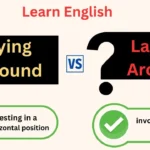Last updated on October 21st, 2024 at 03:20 pm
When it comes to prepositions, choosing the correct one can sometimes be confusing. A common point of confusion is the difference between using “interested in” and “interested on.”
In this article, we’ll dive deep into why “interested in” is the correct choice, while “interested on” is not. We’ll explore the role of prepositions, provide examples, and offer tips to avoid common mistakes.
Understanding Prepositions
What Are Prepositions?
Prepositions are words that link nouns, pronouns, or phrases to other words in a sentence. They help specify relationships in time, place, direction, and more. For example, in the sentence “The book is on the table,” “on” is the preposition showing the relationship between “book” and “table.”
Common Prepositions
Here are some common prepositions and their uses:
- In: Used for enclosed spaces or time periods (e.g., “in the box,” “in the morning”).
- On: Used for surfaces or specific days (e.g., “on the table,” “on Monday”).
- At: Used for specific points or locations (e.g., “at the door,” “at 5 PM”).
Understanding these basic prepositions will help clarify why “interested in” is correct and “interested on” is not.
The Correct Usage of “Interested In”
Definition and Context
When we say someone is “interested in” something, we mean they are engaged or involved in it. The preposition “in” is used to indicate a state of being concerned or enthusiastic about a subject. For instance:
- “She is interested in learning new languages.”
- “They are interested in the latest technology trends.”
Examples in Sentences
To further illustrate, here are some sentences using “interested in”:
- “John is interested in the new art exhibit at the museum.”
- “Maria is interested in studying environmental science.”
- “The students are interested in the upcoming science fair.”
These examples show how “interested in” correctly conveys a genuine interest or enthusiasm about a subject.
Why “In” is Correct
The preposition “in” is used to describe involvement or engagement within a specific area or topic. It aligns with how we naturally think about and discuss interests. Using “in” helps to clearly specify what someone is involved with or curious about, which makes communication more precise and effective.
Why “Interested On” is Incorrect
Common Misconceptions
The phrase “interested on” is often mistakenly used in place of “interested in.” This error arises because some people confuse the usage of “on” with other contexts where it might seem appropriate. For example, people might say:
- “He is interested on playing football.”
- “They are interested on the seminar.”
Examples of Incorrect Usage
Here’s how “interested on” looks in practice, and why it’s incorrect:
- “She is interested on the new book release.” (Incorrect)
- “He is interested on the upcoming conference.” (Incorrect)
In these cases, “on” doesn’t fit because it doesn’t correctly convey the relationship between the person and their interest. The correct form is “interested in”.
Explanation of Incorrect Usage
Using “on” in these contexts is incorrect because “on” typically describes position or surface. For example, we say “on the table” to describe where something is placed, not to express interest. Therefore, “on” doesn’t suit the nuanced relationship expressed by “interested in.”
When to Use “On” with Other Verbs
Appropriate Contexts for “On”
While “on” is incorrect with “interested,” it’s suitable for other verbs. Here are some contexts where “on” is used correctly:
- “She relies on her friends for support.”
- “They are focused on improving their skills.”
Examples with Different Verbs
Here are a few sentences showing the correct use of “on”:
- “He depends on his team for project success.”
- “The company is working on new innovations.”
- “We should concentrate on the most critical issues.”
In these examples, “on” appropriately indicates a relationship of dependence, focus, or work involving specific topics.
Struggling with English? Elevate your skills with our expert guides and tips—unlock your potential At Talk Speaker!
Common Mistakes and How to Avoid Them
Identifying Mistakes
Common errors include using “interested on” instead of “interested in,” especially in informal speech or writing. For instance:
- “She’s interested on the new software update.” (Incorrect)
- “They are interested on joining the club.” (Incorrect)
Tips for Correct Usage
To avoid mistakes:
- Remember: Use “interested in” for interests and involvement.
- Practice: Write sentences using “interested in” to reinforce correct usage.
- Consult: Use grammar resources or tools to double-check your usage.
Additional Resources
Grammar Guides
For further study, consider these resources:
- “The Elements of Style” by Strunk and White
- “English Grammar in Use” by Raymond Murphy
Practice Exercises
Try these exercises to improve your preposition usage:
- Complete sentences: Fill in blanks with “in” or “on.”
- Identify errors: Find and correct mistakes in sample texts.
Conclusion
Summary of Key Points
In summary, “interested in” is the correct phrase to use when expressing interest or involvement in something. “Interested on” is incorrect and should be avoided. By understanding the role of prepositions and practicing correct usage, you can improve your clarity and accuracy in both writing and speaking.
Final Thoughts
Mastering prepositions like “in” and “on” can significantly enhance your communication skills. Remember to practice regularly and consult reliable resources to ensure you’re using prepositions correctly. Clear and precise language helps convey your thoughts effectively, so keep honing your skills!
Call to Action
Feel free to share your examples or questions about preposition usage in the comments below. For more grammar tips and exercises, explore related articles and resources on our website. Happy learning!

Amelia Harris, a passionate educator, simplifies English grammar and vocabulary for learners of all levels. With her engaging style, mastering English has never been easie




